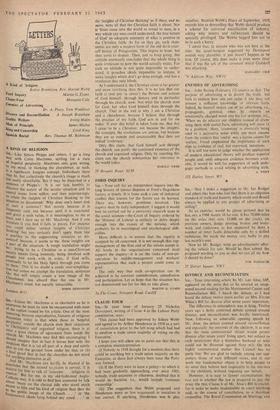A Kind of Religion Robin Denttiston, Rev. Harold Webb
Ford Inquiry Martin G. Evans
Clause Four -Margaret Cole Enemies of Advertising Dr. A. Piney, Tom Waddicor Divorce and Reconciliation A. Joseph Brayshaw Gothic Writers Irving MaIM Man of Principle James Michie
King and Censorship Cecil King
Spanish Burial Rev. Thomas M. Robinson
A KIND OF RELIGION SIR,—Like Simon Phipps and others, I go a long Way with Colin Maclnnes, settling for a state of hopeful perplexity. Maclnnes only goes wrong, !') mY mind, in thinking the churchman, as such, 4 a significant, Jungian concept. Individuals there may be, but collectively the church's image is much less easily identifiable. But it may be discerned in a sentence of Phipps's: it is our task humbly to discover the nature of the secular situation and its central issues from within, and then painstakingly to relate the insights of Christian thinking to the situation so discovered.' Why does one's heart sink at such a sentence? Not merely because it is frequently said, but because until it is translated and given a cash value, it is meaningless, to me at least, and I dare say to Mr. Maclnnes. And if you translate it you find it falls to pieces. For instance You could define 'certain insights of Christian thinking' but you certainly don't apply them like a poultice to the suppurating 'situation so dis- covered' because, it seems to me. these insights are a Part of the situation. A rough translation might be: 'trying to be a Christian in a non-Christian society means living intensely, being involved with People you work with in order, if God wills, eventually to let the Holy Spirit through you come to them.' This is no doubt a crude over-simplifica- t.ion but unless we attempt the translation, sentences like this will simply create a new image of the Churchman, less absurd than the one in. Mr. MacInnes's mind. but equally intractable.
n,


































 Previous page
Previous page